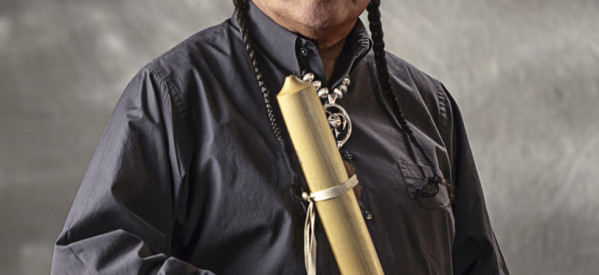The Flagstaff Flautist

R. Carlos Nakai Quartet brings Native American fusion music to MIM
By Lauren Wise
Arizona is a melting pot of musical influences, with the sounds of Native American, Western, and Americana heritage melding with the styles of jazz, hip-hop, rock and country. Music enthusiasts do not have to look far to discover new sonic flavors, bending the wavelengths between traditional and modern. In fact, it’s one of the factors that most attracts musicians to Arizona—and reminds native musicians to cherish it.
R. Carlos Nakai is one such musician. A world-renowned performer of the Native American flute, the Arizona native has received two gold records (for Canyon Trilogy and Earth Spirit)—the first and only Native American recordings to achieve that status—garnered 11 Grammy nominations, and sold over four million albums throughout his career.
Of Navajo-Ute heritage, Nakai plays music that may be rooted in traditional flute, but he combines it with classical, jazz, and New Age styles. He preserves his own heritage alongside others, embracing the constant growth that naturally occurs in a musician’s style. From collaborations with Philadelphia Orchestra’s Israeli cellist Udi Bar-David (they released an album that blends Native American melodies with Jewish and Arabic songs), to Japanese folk ensemble Wind Travelin’ Band, to American composer Philip Glass, Nakai is all about the experimentation while keeping the foundation of cultural music. That’s something he attributes to the local music scene and culture.
“The variety of innovative artists [here] who express, with their original melodies, the multicultural dimensions of acoustic sound possibilities,” Nakai explains about his love for Arizona music. “My favorite thing about Arizona is the variety in sound.”
Nakai was born in Flagstaff and studied brass instruments at NAU while playing in the marching band. By his sophomore year, he enlisted in the U.S. Navy with the goal of playing in the Armed Forces Band, but was ultimately not able to join due to a mouth injury from an auto accident that prevented him from playing the correct embouchure on a brass instrument. This serendipitous event led him to start playing the traditional Native American cedar flute in the ‘80s. Then in the ‘90s, he developed the Nakai tablature, a notation famously used across a broad variety of flute tunings and keys.
“The tablature is a writing technique in the language of standard notation practice,” Nakai explains. “[It’s] intended for individuals with no music training… and utilizes visual clues to write their own melodies.”
In 1996, he published this in The Art of the Native American Flute with James Demars, Ken Light and David P. McAllester, as a resource for other Native American flute musicians.
Nakai continued to merge the genres of jazz and classical, and went on to found the ensemble the R. Carlos Nakai Quartet, an exploration of jazz and ethnic music combining the cedar flute with sax, drums, keyboards, bass, and female vocals, which fans can hear at the Musical Instrument Museum on February 23.
Now, almost 40 years into his career, he’s released more than 50 albums—but does he have a favorite? “My favorite is always my first one, Changes,” he says. This collection of 15 solo songs of traditional, free-flowing Native American flute ties together Lakota, Zuni, and Blood melodies along with Nakai’s own stylistic twists from traveling around the U.S.
While that album ranks as his favorite—and a favorite among fans—Changes wasn’t one of his eleven Grammy nods. Ranging from ‘94’s Ancestral Voices (Best Traditional Folk Album) to 2002’s Fourth World (Best New Age Album) to 2008’s Reconnections (Best Native American Album), the Grammy nominations for his extensive catalog make it easy to see his talent for expanding upon genres. “Each represented a newer idea in their time that continues to influence tomorrow,” Nakai explains when asked about his passion for traditional, contemporary and classical styles.
Nakai continues to expand on his passions, and has contributed music to the major motion pictures New World and Geronimo; co-authored a book with composer James DeMars, The Art of the Native American Flute; and performed with over 30 symphony and chamber orchestras. The Library of Congress has more than 30 of his recordings archived in the American Folklife Center. In 2005, he was inducted into the Arizona Music & Entertainment Hall of Fame.
Now residing in Tucson, the 72-year-old artist is touring to promote his extensive catalog (his last album was released in 2014). However, don’t expect Nakai to hang up his flute any time soon. When asked what he’s currently working on, it’s clear he plans to keep pushing the boundaries: “Exploring techniques for taking my sounds into newer realms of expression.”
R. Carlos Nakai Quartet performs at 7:30 p.m. Saturday, February 23 at the Musical Instrument Museum, 4725 E. Mayo Boulevard in Phoenix. Tickets cost $33.50-$43.50. For more information, call 480-478-6000 or visit mim.org.
Related posts
Leave a Comment
You must be logged in to post a comment.






